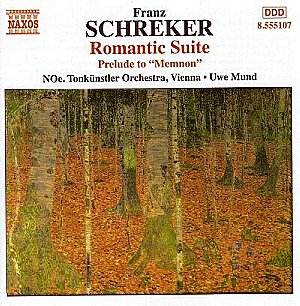As a disc previously available on Klaus Heymann’s enterprising
full price Marco Polo label in 1988, the re-issue of this Schreker coupling
has come at an interesting time. Along with many other composers of
Mahler’s Vienna (Korngold, Zemlinsky, Ullmann etc.), Schreker has been
consigned to little more than a dictionary entry for many years. A radical
re-appraisal of neglected figures has been going on in recent times,
fuelled in the main, by record companies willing to explore such repertoire.
With the wide dissemination a record can offer (as opposed to an isolated
concert), the resulting interest in these once famous figures has grown
considerably.
Schreker is a perfect example of this. In the 1910s,
he was regarded as the third member of German music’s avant-garde triumvirate,
alongside Richard Strauss and Arnold Schoenberg. His major opera ‘Der
ferne Klang’ (The Distant Sound), established him as a leading modernist,
and was an acknowledged influence on Alban Berg. He conducted the world
premiere of Schoenberg’s Gurrelieder in 1913, and in 1920 was
appointed to the prestigious position of director of the Hochschule
für Musik in Berlin, where he presided over an impressive teaching
staff that included Hindemith. Unfortunately, by the mid-twenties his
opulent style was rapidly going out of fashion, as the more acerbic
manner of composers like Weill, Krenek and Hindemith himself, began
to find favour. The rise of Nazism soon changed the cultural and political
climate for all these composers. Condemned eventually for his race,
his homosexuality and his music, Schreker was dead before his 56th
birthday.
I would imagine the re-release (at budget price) of
the present disc, has been prompted by the success of the excellent
ongoing series of Schreker’s orchestral music by the BBC Philharmonic
under Vassily Sinaisky. The first couple of those Chandos issues are
very well filled, in demonstration sound and with polished, committed
performances. This Naxos disc is not quite in that league, but is a
third of the price and worth investigating on its own terms as it doesn’t
duplicate any items (so far).
One textbook I have sums up Schreker’s style as ‘reminiscent
of both Richard Strauss and Debussy…[he] creates an impressionistic
sound-world of ever-changing colours and moods, a style perfectly suited
to the post-Freudian psychology of his subjects’. The first item on
this disc fits this description well. It started out as the Prelude
to a Grand Opera, the proposed opera being Memnon, a work
never in fact written. The prelude ended up being closer to a Straussian
tone-poem, with a large orchestral palette, exotic melodic contours,
and seductive textures to suit his fantastical Egyptian subject. The
opening horn call sets the scene, and the following sinewy clarinet
line calls to mind parts of Salome. This is mature Schreker,
and the score throughout shows a real mastery of line and melody. Even
when other composers are hinted at (Mahler is also never far away),
Schreker is his own man, and the whole substantial piece builds to a
satisfying conclusion.
The Romantic Suite is a relatively early work,
displaying a confidence well suited to the more optimistic start of
the century. It reminded me, in some ways, of Korngold’s even more youthful
Sinfonietta, such is the confident handling of the orchestra
and the thematic material. The expansive Idylle, which opens
the piece, has a breadth and grandeur that are memorable; a mercurial
Scherzo follows, and the third movement is an Intermezzo
for strings that, as an earlier separate entity, had apparently won
a prize for its composer. The last movement, marked Tanz (allegro
vivace), has the distinct feel of a symphonic finale, and is a fitting
culmination to an impressive piece.
The performances are adequate, though this heady, late-Romantic
music needs sumptuous orchestral playing (and recording to match), which
is just what it gets on Chandos. It is a pity that other pieces could
not be included, as 49 minutes playing time is a bit miserly. Still,
as ever with this label, it is cheap, decently recorded, and well worth
investigation from those who care about composers from the margins of
music history.
Tony Haywood


